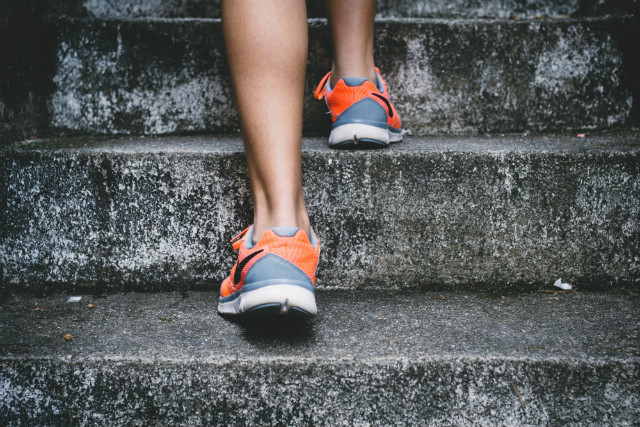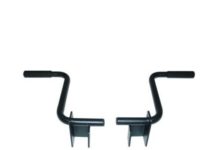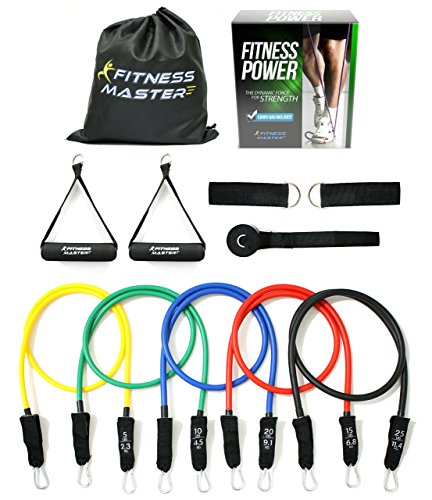If I eat this it’ll help me lose fat, and that will make me like myself more.
If I eat this it’ll cause me to gain fat, and that will make me hate myself more.
I have to do this workout so I can lose fat, fix my flaws, and finally like my body.
For a four-year period that’s how I analyzed everything I ate and drank; I even scrutinized the calories in a stick of gum. My workouts were about one thing: building a better body and fixing my trouble areas, because I didn’t like how I looked. So I’d work out as hard, for as long, as I possibly could. The workouts left me exhausted but this meant, at the time, that I did my best and had a great workout. The more fatigue I accumulated, the better the workout.
Disliking my physical features wasn’t confined to this period (roughly 19-23 years old). Beginning in grade school and going through high school I was made fun of for having a large nose. From “That thing is so ugly!” to “Nia, move, you’re blocking the sun!” the comments flowed from classmates. Then in high school I was also made fun of for having a big butt because, apparently, I had a big butt before big butts were desirable.
Years of being teased and judged by my physical appearance led me to believe one thing: it’s better to look and act the way other people expect me to, or I’d be ridiculed. You better look the part, or brace for insults.
Problem solved! I couldn’t fix my nose or butt, so I focused on what I could change. I started to dress different, changed my hair, stopped doing tomboy things (e.g., rollerblading, skateboarding, etc.), and began acting ‘more like a girl.’ This led to a decrease in insults, so I declared it a successful mission.
Fast forward to 18. I’d been strength training for several years and started experimenting with different diets out of curiosity and to increase my knowledge about how different eating regimens (e.g., low carb, high carb, several small meals throughout the day, etc.) affected my appearance. At this time I Ioved working out; it was damn fun to get stronger every week and discover the incredible things my body could do, like bust out numerous chin-ups and bench press my bodyweight. Manipulating my diet to ensure I got the best results possible from my efforts was, for the most part, enjoyable too. So what if I avoided entire food groups or refused to eat anything ‘bad’; I was on a mission to build the best body possible and this was a worthy sacrifice.

Then it happened — my first episode of binge eating.
We went out for a family dinner and I ordered the meal I found on the online menu before we arrived (scanning menus before going out to eat was an established habit at this point so I could make the ‘best choice’): salmon with steamed vegetables with absolutely no butter, I emphasized to the waitress. And, of course, I avoided the bread and other ‘unhealthy things’ during the meal.
Afterward I returned to an empty house, unsatisfied from dinner. I wasn’t hungry, but my taste buds felt neglected. I’d been eating boring meals and avoiding anything with a high sugar plus fat combination for so long. After poking around the pantry I started snacking on a few things, then moved to the fridge, then back to the pantry. The best way I can explain what happened next was I went into a trance; I started eating everything. I wasn’t thinking, I just kept putting food in my mouth.
After about half an hour I’d eaten a surplus of food and my stomach ached from being so full.
“Holy crap. What the hell just happened?” I wondered in amazement. Nothing like that — losing complete control — had happened before. And it shook me. I didn’t know it at the time, but that was the first of a multitude of binges I’d experience over the next four years; it was the catalyst to the increasing self-hatred I’d develop.
Jump forward two years. The binge eating episodes progressed from occasionally to, at its apex, a daily habit. A box of cereal, a jar of peanut butter, and handfuls of other items; those were the casualties of a single binge. I loathed myself, and this habit had a vice grip on me. This powerful habit eventually left me with severe stomach pain from bile leaking into my stomach, as confirmed by a HIDA scan my doctor ordered when I complained of stomach issues (I neglected to tell her, of course, about my binge eating problem).
Throughout this experience, in an attempt to gain control of the binges and lose the fat I’d accumulated, I tried to follow several low-calorie diets; I counted every single calorie I consumed, measured and weighed my food diligently. I tried to follow a low-carb diet for a stint of time, along with a string of other diets. But these desperate attempts — turning to a diet to solve my issues — only exacerbated my disordered and binge eating problem.
For reference, before the binge eating I weighed approximately 115 pounds and as a result of the daily binges I got up to about 143.
Hey, did I neglect to mention during this time I was a certified personal trainer? That made me disgusted with myself even more; I felt like a failure. Due to the fat gain I no longer looked the part, and the multitude of mirrors at the gym were a constant reminder of my fraudulence.
Another piece of the ‘I hate my body’ puzzle: plagued with self-hatred for my inability to stop binge eating and the fat I was steadily accumulating my workouts had one purpose — punishment. They were punishment for the thousands of calories I’d consumed the day before, or those I knew would be ingested later in the day. Punishment for losing control. Punishment for the increasing layer of fat developing over my once flat stomach; for my thighs that were steadily growing out of my clothes; for my face that filled out into an unrecognizable shape; for the muscle definition in my arms and shoulders that was vanishing; for no longer meeting the criteria I thought others expected of me. This self-flagellation consumed me.

I’m exhausted and my stomach hurts, but I must do this workout so I can burn off those calories. I ate too much, now I must make up for it the best I can.
Working out was the only thing I could control, and I’d do as much as I could, as often as I could.
Daily, multiple bouts of cardio were one of my tools. I’d arrive at the gym around five a.m. before my first client and perform half an hour of cardio; I’d squeeze in more between clients throughout the day. And I performed at least four strength training sessions per week too.
This was my life: persistently thinking about food (what I could eat, what I shouldn’t eat, how I ccould avoid the next binge, how I’d vow not to undo the hard work I’d complete at the gym by binging later in the day), how much I hated my body and what I’d become, and incessantly trying to work off the accumulating fat and binge episodes through exercise.
I detested my body. I’d glare at my reflection in the mirror with utter disdain. I’d poke my stomach, criticize my butt and increasing stretch marks, and make detailed notes about everything I hated and wanted to change. It was a long list.

I thought hating myself and using that ‘motivation’ to fuel my workouts was the solution. I thought I could ‘hate my way’ to being skinny again and more attractive. “I hate how my body looks now, and I’ll like it once I lose this excess fat,” I assumed.
This vicious cycle was stuck on repeat: binge, hate myself, go work out for hours, try a restrictive diet hoping it would be the solution, binge, hate myself, go work out, try a different diet, binge …
Then my revelation occurred: trying to ‘hate my way’ back to skinny or more attractive wasn’t working, nor could it work.
‘Hating My Way’ Back to Skinny Wasn’t Working
Restrictive diets made my relationship with food worse, and punishment-driven cardio and strength training sessions turned working out into a loathsome chore.
To finally make progress I knew it was time for a drastic change. Everything I’d tried up to that point (e.g., various diets, grueling workouts, piling on the cardio) intensified my problems, so I figured why not try the opposite approach. This required a change not only with my eating and workout habits, but other elements as well.
Instead of restrictive diets I’d follow the fewest principles possible. I chose to focus on eating a wide variety of real foods and refused to label any food ‘good’ or ‘bad’; I needed to alter my perception of what constituted healthy eating habits and choices. I made sure the foods I did eat were enjoyable, and not bland. And I enjoyed my favorite not-so-healthy foods when I really wanted them, but kept portion sizes in check (for example, if I wanted ice cream I’d go buy a single serving).
No more traditional ‘dieting’ or having a list of forbidden or evil foods to avoid. No more set times to eat or avoid eating. I retrained my body to recognize hunger and satisfaction (without being overly full); it took time but was worth the effort.
Instead of following rigid rules and restrictive diets wanting immediate fat loss results, I opted for simple, flexible principles that built sustainable habits.
Related Article: The Diet That Has No Name (And Why It May be The Best Thing Ever)
When I slipped up, I’d respond with compassion, and then move on. I knew breaking free from disordered eating habits and hating my body wouldn’t change quickly. I committed to not chastising myself when I messed up. Whereas before, after a binge, I’d berate myself and declare to be a worthless, weak, and disgusting failure, I committed to learning from the situation and use that knowledge to do better next time (e.g., I gave into a binge because I skipped breakfast, so tomorrow I won’t skip breakfast; lesson learned and I can’t change what happened so I’m going to move forward). I put the episode behind me and focused on doing something positive going forward.
When I messed up I took that as an opportunity to learn why, made a plan for the next time the situation occurred, and moved forward without criticizing myself.
Related Article: You Don’t Have Enough Self-Compassion
Workouts could no longer be about burning calories or punishing myself. From then on strength training became about one thing: improving my performance in some small way. I scaled back my strength training to 3-4 times per week and focused on a few basic exercises each workout. All that mattered was beating my previous performance in some small way. Initially I was worried I wasn’t working ‘hard enough’ because not only was I enjoying training again, but I’d finish my workouts feeling empowered instead of exhausted. But I was committed to trust this new, empowerment-focused process.
I traded in the countless hours of cardio for moving my body in enjoyable ways. That meant hiking, riding my bike, walking my dog, and searching for other fun activities to do.
Instead of working out for the purposes of torching fat, punishing myself for eating too much, and hating how I looked I started to focus on improving my performance, feeling great and more energized, and discovering what my body could do — then doing more. Tearing myself down was no longer an option; the only ‘beating up’ that occurred was to my workout log.
Related Article: Exercise is Not Punishment and You Don’t Have to Earn Your Food
Drastically altered my perspective. I admitted that for the last decade my self-worth was tied to the expectations and opinions of others, and I valued myself based on the appearance of my body. This was a recipe for absolute misery because a) you can’t control other peoples’ opinions and b) your value as a woman isn’t proportional to your weight, body fat percentage, the shape of your ass, your bra size, your age, or any other external measure. It was time to change my values, metrics of success, and set my own standards.
I had to stop basing my values on external factors and look inward to what I could control. Instead of relying on numbers, like my weight, or the approval of others, I created new success measures. Success meant feeling great, moving well, and cherishing my physical abilities. It meant eating meals that made me feel good and ensuring these actions improved, rather than dominated, my life. I set my own standards for what it meant to be a good woman and did the things I wanted to do, what made me feel great, and was true to who I was. Not everyone would like it, and I had to become comfortable with that reality.
This was my first step to becoming the woman I wanted to be, not who I thought others expected me to be. It was terrifying, but liberating.
This had to be something I did to become the best version of myself, to build me up (physically and mentally) instead of tearing me down (emotionally). Health and fitness, specifically, had to enhance my life and became part of it, not a regimen I revolved my life around.
Remind myself to be patient. Anyone who has battled disordered eating habits or binge eating knows the overwhelming desperation you feel — you just want to get past this obstacle. I had to remind myself, multiple times per day, that I didn’t suddenly develop those habits, so I couldn’t expect to change them quickly either.
Instead of obsessing over the day I’d be beyond this struggle I chose to focus on racking up small wins: eating a good meal, having a great workout, positively altering my perspective, moving my body in enjoyable ways, acting on my values. I knew the more small wins I accumulated the closer I’d get to the bigger goal. And I savored my accomplishments; instead of striving and depriving my way, as I’d done previously, to get leaner, smaller, and anything-er I committed to being proud of what I had already achieved, to enjoying the process, and allowing my efforts to be their own reward.
Accepting that the process must be rewarding was a valuable lesson.
Be persistent. I knew I’d mess up. I knew I’d give in to a binge. I knew I’d catch myself falling back into patterns of self-hatred. I knew other obstacles would appear. But I would persist. Propelling ever forward was my only choice. I could choose how to perceive and respond to anything I encountered or experienced. I sought to learn from every situation and use it to grow stronger, more resilient. When challenges blocked my path, I’d emerge on the other.
Those changes to my eating, training, and mindset were the beginning of what would compose my health and fitness philosophy. It’s what led me to creating this website and sharing my experiences, the good and ugly. It’s why I occasionally get frustrated with the surplus of gimmicks that promise women happiness is only a few dress sizes away and call it out for the bullshit it is. It’s why I tell women to appreciate the overlooked benefits of strength training that go beyond building a lean, fit body.
I know what you’re wondering: did those changes work? It took time but I eventually broke free from binge eating, and working out is never done as punishment. I’m finally able to say that I love my body — it’s strong, healthy, and serves me. But how it looks does not dictate my self-worth. Health and fitness, above all, is a tool to become the best version of myself. It enhances my life and doesn’t dominate it
A Few Additional Lessons
Because sometimes you’d rather scan bullet points instead of read a lengthy article:
- Don’t become obsessed with doing more or becoming something-er (leaner, stronger, etc.). Stop, and appreciate what you’ve already done. Commit to making the journey — the process — its own reward.
- Take time to choose the values, measures of success, and people that matter to you. Forget the rest.
- Determine your values. Then start practicing them immediately.
- Loving your body may be easier said than done. Begin by discovering what it’s capable of doing, moving it in ways that feel good. Improve its function and strength.
- Understand there’s a tremendous difference between wanting to lose weight or transform your body because you despise how you look and think doing so will finally make you happy or improve your self-worth (i.e., trying to ‘hate your way skinny’ as explained above) and doing those things because you enjoy the process and the challenge, and because they make you a better version of yourself apart from the physical changes.
- Health and fitness should enhance your life, not be an unruly obsession.
- Don’t strive for perfection — focus on the few things you must-do, and do them consistently.
- Redefine success. Health and fitness, believe it or not, does not have to be about losing fat and sculpting the perfect ass.
- Fitness shouldn’t be a dreadful activity. Find a way to make it enjoyable.
- Stop caring about what other people think. If you’re doing the above, then their opinions don’t matter.
If you ever find yourself obsessing over your food choices, punishing yourself with workouts, trying to build a better body because you think that will finally make you happy, or you just want to discover a better, empowering way to strength train and eat well, I invite you to continue reading this website.
Here are some additional articles to get you started:
- Why I Refuse to ‘Embrace My Flaws’ (And You Should Too)
- 32 Beautiful Badass Strength Training Tips and Principles
- My Body (And Her Body) Is Not Your Measuring Stick
While you’re at it, grab the free Beautiful Badass Mini Course by joining the newsletter below.
The post My Experience Trying to ‘Hate My Way’ Back to Skinny appeared first on Nia Shanks.






